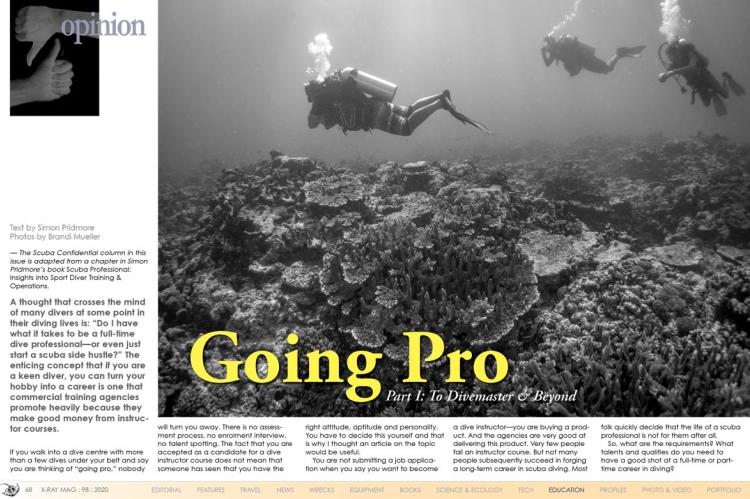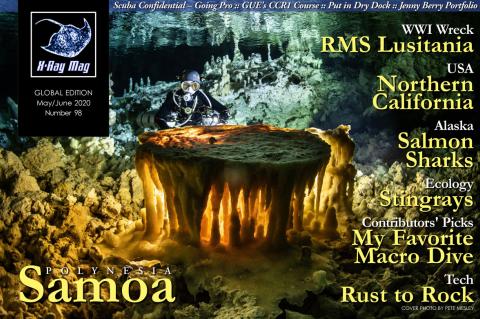Going Pro – Part I: To Divemaster and Beyond
A thought that crosses the mind of many divers at some point in their diving lives is: “Do I have what it takes to be a full-time dive professional—or even just start a scuba side hustle?” The enticing concept that if you are a keen diver, you can turn your hobby into a career is one that commercial training agencies promote heavily because they make good money from instructor courses.
Tags & Taxonomy
If you walk into a dive centre with more than a few dives under your belt and say you are thinking of “going pro,” nobody will turn you away. There is no assessment process, no enrolment interview, no talent spotting. The fact that you are accepted as a candidate for a dive instructor course does not mean that someone has seen that you have the right attitude, aptitude and personality. You have to decide this yourself and that is why I thought an article on the topic would be useful.
You are not submitting a job application when you say you want to become a dive instructor—you are buying a product. And the agencies are very good at delivering this product. Very few people fail an instructor course. But not many people subsequently succeed in forging a long-term career in scuba diving. Most folk quickly decide that the life of a scuba professional is not for them after all.
So, what are the requirements? What talents and qualities do you need to have a good shot at a full-time or part-time career in diving?
Here is a short summary of what I see as the key factors:
Dive technique
Your personal diving skills need to be excellent and instinctive, so that you can devote 100 percent of your attention to the divers in your charge. But good technique alone does not make you a good dive instructor.
Knowledge
Your diving knowledge should be well beyond the level you are teaching. Simply reading the material the night before the class is not enough. Scuba diving students are not passive drones. Many will be smarter than you and will have informed questions. It is very helpful to have some wider knowledge in related fields also, subjects such as marine biology, human physiology or gas physics.
Experience
You should have experience of a variety of types of diving and diving environments. Your breadth of experience will be more valuable than the number of dives you have done. You will find yourself drawing on this when you need to find a context to illustrate a teaching point.
Vocation
You need to have a teaching vocation. If you have done teacher training, are already a teacher or trainer in another walk of life and like what you are doing, so much the better. As a dive instructor, you will spend most of the time teaching. If you do not get excited at the prospect of passing on the joy of the sport and seeing a diver’s eyes light up when they conquer their fears and “get it,” then you will not remain a dive instructor for long.
The other reason I place vocation so high on this list is that jobs in scuba diving are not well paid, so you will need to have the same sort of dedication that other professionals like nurses or schoolteachers have, in order to endure long, difficult working hours for little financial reward.
People skills
Dive professionals have to be people persons, as their whole day is spent interacting with people. Many scuba instructors in the early days were not so much people who liked people; they were people who liked ordering other people around. Today, the world of scuba diving is very different. Sympathy and empathy are the key words; if you can develop bonds easily and have the capacity to understand what someone is experiencing from within their frame of reference, you will make a good dive instructor.
An inner calm
Groups of divers are composed of freethinking, unpredictable, excitable individuals who can disrupt your carefully laid plans in an instant. The limits of a dive instructor’s ability to remain calm are tested every day.
Time management skills
It is crucial for a dive instructor to know how to manage time. Whether you are teaching a course or leading a group of divers, you are always limited by time. You have to exercise time discipline yourself and ensure that your students and customers do likewise, all without spoiling the fun. It is a tough balance to achieve.
Employability
If you see becoming a dive instructor as an opportunity to leave home and head for an exotic tropical destination, you will find plenty of job vacancies. Dive instructors often burn out or move on. Recognise, however, that you will be competing in an international job market where everyone has your diving qualifications and more. So, you must have other strings to your bow too, in order to find work. The ability to speak a number of languages is very useful, as is a work background as a mechanic or in the hospitality, service or travel industries.
If you plan to stay at home and teach diving part-time as a side hustle, then your success will depend on finding a local dive centre through which to teach and coming up with a hitherto-untapped source of potential scuba diving students, beyond your family and friends. Have a viable business plan before embarking on your instructor course.
Fitness
You need to be physically and mentally fit. Full-time scuba instructors dive between 15 and 30 times a week and work long hours. A lot of that time involves hauling gear and loading and unloading trucks and boats. They are also “on stage” for much of the time, keeping the customers happy and entertained. There is not much downtime and, in high season, very little time off.
The divemaster myth
You will have noticed that, despite having referred to the role of divemaster in the title of this piece, I have mostly discussed becoming a dive instructor. It may be that you want to guide divers, rather than teach them. Unfortunately, although the training agencies refer to divemaster as a professional qualification, in practice, if you hail from a country that likes to think of itself as “first world,” it is almost impossible to find a paid job in scuba diving if you are not at least an instructor.
Generally speaking, the only people without instructor qualifications who can find paid work as guides or divemasters are people from countries where economic levels are much lower than in the West. These folk earn extremely low salaries and the main reason they are not instructors is that they cannot afford the course fees, which, everywhere in the world, are set at first-world levels (a shameful aspect of the sport diving industry that will no doubt be the focus of a future article in this series). ■
This Scuba Confidential column in issue #98 was adapted from a chapter in Simon Pridmore’s book Scuba Professional: Insights into Sport Diver Training & Operations.
Simon Pridmore is the author of the international bestsellers Scuba Confidential: An Insider’s Guide to Becoming a Better Diver, Scuba Professional: Insights into Sport Diver Training & Operations and Scuba Fundamental: Start Diving the Right Way. He is also the co-author of the Diving & Snorkeling Guide to Bali and the Diving & Snorkeling Guide to Raja Ampat & Northeast Indonesia. His recently published books include Scuba Exceptional: Become the Best Diver You Can Be, Scuba Physiological: Think You Know All About Scuba Medicine? Think Again! and the Dining with Divers series of cookbooks. For more information, see his website at: SimonPridmore.com.
Download the full article ⬇︎




